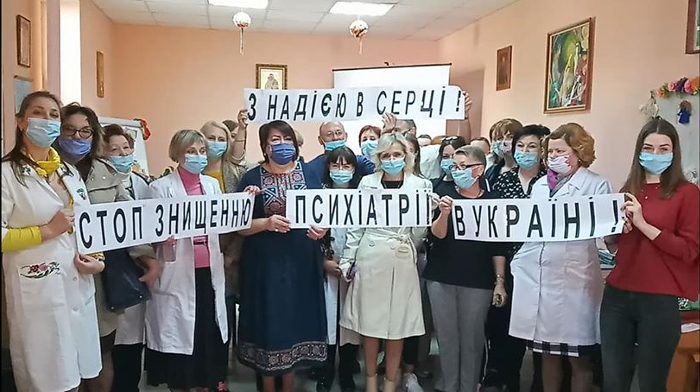Challenges in the provision of mental health care to children and adolescents during the COVID-19 pandemic in Ukraine
By Dmytro Martsenkovskyi1,2 and Igor Martsenkovsky2
1 Bogomolets National Medical University
2 SI Research Institute of Psychiatry, Ministry of Health, Ukraine

The current pandemic of COVID-19 and it’s burden on the health care system as a whole, has posed achallenge for children’s mental health care system in Ukraine.
Ukraine, like other countries around the world, experienced challenges associated with the pandemic and quarantine restrictions. One of these challenges is a significant decrease in access to mental health care that was associated with the need for physical distancing. As a result of quarantine requirements, most of the community-based psychiatric facilities were closed, while existing inpatient units admitted only patients with urgent conditions. According to the Association of Psychiatrists in Ukraine, more than 75% of patients lost access to mental health care.
Ukraine has a highly centralized mental health care system. The majority of mental health care units for children are part of huge psychiatric hospitals. This meant that many children with mental disorders and COVID-19 were not able to receive the appropriate care. Infectious disease units didn’t admit patients with significant mental health impairment, while child psychiatric units were unable to admit them as well due to the lack of specialized equipment and staff.
“Infectious disease units didn’t admit patients with significant mental health impairment, while child psychiatric units were unable to admit them as well due to the lack of specialized equipment and staff.”
The need for physical distancing led to the rapid utilization of telepsychiatry around the world, and Ukraine was no exception. However, the availability and quality of offered care were not always enough to satisfy the needs. Adolescents often could not seek help online because they were in the same room with their caregivers. That posed a significant challenge, particularly in cases of family abuse and neglect. For these children, some services were provided via online messenger platforms.
Due to quarantine, many children with special needs, especially those with pervasive developmental disorders, lost access to their specialized school support programs. At the same time, distance learning could not provide the type of support they needed.
Through the pandemic we observed significant changes in consultation requests. There was a significant increase in requests from children’s multidisciplinary hospitals for cases of suicide attempts, severe self-harming behavior, and psychotic disorders. Additionally, there was a significant increase in the requests for parent behavioral training sessions and CBT sessions for children with ADHD.
We hypothesize that the significant increase in the severity of suicidal and self-harming behavior may be the result of a combination of factors. First, parents were afraid of exposure to COVID-19 and preferred not to seek assistance immediately. This was also complicated by insufficient online therapeutic resources. Secondly, during the quarantine children lost the ability to go to school and meet with their peers that is a significant protective factor. Thirdly, many children were exposed to domestic violence and abuse and were locked down with their perpetrators. Additionally, this all occurred at the same time where mental health care services were being reformed, which resulted in the temporary or permanent closure of outpatient psychiatric facilities.
The increase in requests for assistance for children with ADHD coincided with a shortage of needed medication. As a result, their parents were searching for all possible alternative forms of assistance. Due to legal limitations, a lot of medications that are widely used for the treatment of ADHD, tic disorders, epilepsy, and others are not available in the Ukrainian market and parents would obtain such medicines from abroad. As a result of the border lockdown and travel restrictions, many of these children were no longer able to obtain their medications, significantly impacting their conditions.
Another urgent problem is the provision of mental health care for children with war-related PTSD. Many of them are still living in the war-effected regions and having difficulties with access to schools and medical facilities. These children received most of their care from international volunteer organizations that had to suspend the provision of assistance as a result of quarantine restrictions.
Besides the COVID-19 crisis, Ukraine today is in the process of very painful reforms in the field of medical care provision. Driven by cost control measures, medical institutions needed to reduce their medical staffing. Mental health care was one of the areas that became severely underfunded, which resulted in the closing of psychiatric facilities in different regions of Ukraine.

Medical personnel and patient organizations protesting the significant decrease in funding of the biggest psychiatric hospital in Ukraine (photo by O.Shevchuk, Kyiv, Ukraine).

Medical staff protest against the destruction of psychiatry in Ukraine (photo by M.Starytska, Lviv, Ukraine)
“Mental health care was one of the areas that became severely underfunded, which resulted in the closing of psychiatric facilities in different regions of Ukraine.”
While the COVID-19 pandemic resulted in increased psychological distress and need for specialized mental health care, the number of practicing child psychiatrists is rapidly decreasing. At the same time, primary care doctors are not ready to fill in the gap. Child psychiatry and healthcare, in general, was never the priority. The consequences of this shortcoming will be felt for decades to come.

